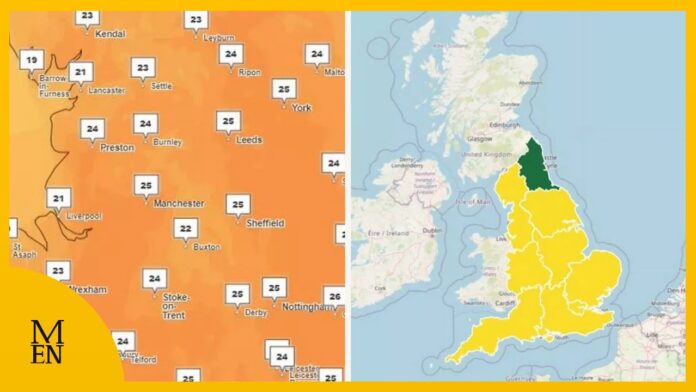Most of England braces for soaring temperatures amid health warnings, with the east midlands and southeast under the strongest alerts
A yellow heat health alert has been activated across most of England today as temperatures are set to soar, reaching up to 31°C in some regions. The alert, jointly issued by the UK Health Security Agency (UKHSA) and Met Office, highlights concerns over potential health impacts during what is expected to be a brief but intense mini-heatwave lasting until midweek.
The alert, effective from 8 am today until 5 pm on Thursday, covers all regions except one, cautioning against increased pressure on healthcare services due to the extreme heat. Temperatures are predicted to peak at 31°C in certain areas, with widespread mid-20°Cs expected across the country. Some regions may even experience conditions meeting the criteria for a heatwave, defined as three consecutive days of high temperatures surpassing established thresholds.
The East Midlands, East of England, East Anglia, and the South East face the most severe warnings, citing potential significant impacts on health and social care sectors, particularly affecting older adults and those with underlying health conditions. The UKHSA has emphasized an expected rise in mortality rates, predominantly among individuals aged 65 and older, although younger age groups may also be affected.
For other regions like the North West, North East, West of England, South West, and London, the alert warns of increased mortality risks among vulnerable individuals and the likelihood of indoor environments becoming uncomfortably warm.
Analysis:
Political Perspective: The issuance of the heat health alert reflects governmental responsibility in managing public health during extreme weather events. It highlights the necessity for robust public health policies and emergency response strategies to mitigate heat-related health risks. Politically, such alerts emphasize the role of governance in safeguarding vulnerable populations, ensuring adequate healthcare provisions, and promoting climate resilience measures. The alert serves as a call to action for policymakers to prioritize climate adaptation and mitigation efforts to protect public health amidst increasingly frequent and intense heat waves.
Social Perspective: From a social standpoint, the heat health alert illuminates disparities in heat vulnerability among different demographic groups. Elderly individuals and those with pre-existing health conditions face heightened risks, underscoring the need for targeted interventions and community support systems. It prompts discussions on the equitable distribution of resources, access to cooling centres, and public education on heat safety practices. Socially, the alert highlights the importance of community resilience and solidarity in times of climate-related emergencies, fostering a collective responsibility towards protecting vulnerable members of society.
Racial Perspective: While not explicitly racial, heatwaves often exacerbate existing socio-economic disparities, disproportionately impacting marginalized communities. Factors such as inadequate housing, limited access to air conditioning, and socio-economic factors can amplify heat-related health risks among minority groups. The alert raises awareness about environmental justice issues, urging policymakers to address systemic inequalities in urban planning, infrastructure development, and healthcare access. It underscores the intersectional nature of climate impacts, advocating for inclusive strategies that prioritize the most vulnerable communities.
Gender Perspective: Gender dynamics during heat waves are significant, as women may face distinct challenges related to heat sensitivity, hormonal fluctuations, and caregiving responsibilities. Pregnant women, women experiencing menopause, and those in lower-income households may be particularly vulnerable to heat-related health impacts. The alert emphasizes the importance of gender-sensitive policies and public health interventions that account for diverse health needs and vulnerabilities. It calls for targeted support systems and inclusive health strategies that promote gender equity in climate adaptation efforts.
Economic Perspective: Economically, the heat health alert affects various sectors, including agriculture, construction, and tourism, where outdoor work and visitor activities may be disrupted or limited. Businesses may incur additional costs due to increased energy consumption for cooling purposes or reduced productivity during extreme heat. The alert signals potential economic impacts, prompting businesses and industries to implement adaptive measures, such as flexible working hours, heat stress protocols, and investment in heat-resilient infrastructure. It underscores the importance of climate-smart economic policies that prioritize sustainability and resilience in the face of climate change.
